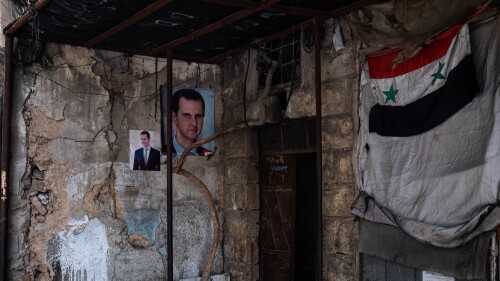[JP title: Washington’s conflicting signals]
The Bush administration’s counterterrorism policies appear tough, but inside the courtroom, they evaporate, consistently favoring not American terror victims, but foreign terrorists.
Consider a civil lawsuit arising from a September 1997 suicide bombing in Jerusalem. Hamas claimed credit for five dead and 192 wounded, including several Americans. On the grounds that the Islamic Republic of Iran had financed Hamas, five injured Americans students sued it for damages.
Expert testimony established the regime’s culpability during a four-day trial, leading Judge Ricardo M. Urbina, under the Flatow Amendment of the Foreign Sovereign Immunities Act, to fine the Iranian government and its Revolutionary Guard Corps US$251 million in compensatory and punitive damages.
The plaintiffs looked for Iranian government assets in the United States to seize, in accord with the little-known section, 201a of the Terrorism Risk Insurance Act of 2002, which states that “Notwithstanding any other provision of law … in every case in which a person has obtained a judgment against a terrorist party on a claim based upon an act of terrorism … the blocked assets of that terrorist party … shall be subject to execution.”
An ancient Iranian fragment similar to the ones in legal dispute in a terrorism case. |
Finding Iranian assets, however, proved no easy task, as most of them had been withdrawn by the Iranian authorities after the embassy hostage crisis of 1979-81. Therefore, the victims’ lead lawyer, David Strachman of Providence, R.I., devised some creative approaches, such as intercepting the imminent return of ancient Iranian clay tablets on loan to the University of Chicago for up to seventy years. Strachman found just one significant cache of Iranian government money: approximately $150,000 at the Bank of New York, in an account belonging to Bank Melli, Iran’s largest bank and a fully-owned subsidiary of the regime. However, when the plaintiffs sued for these funds, BoNY filed a federal lawsuit asking for a legal determination what to do with its Bank Melli assets.
The victims’ task in this case may have appeared easy, given that the U.S. government (1) views Bank Melli as an “wholly-owned instrumentality” of the Iranian government and it (2) considers that government a ".”
But no, the U.S. Department of Justice “entered this case as amicus curiae in support of Bank Melli.” It did so, explained a spokeswoman for the Treasury Department, “to vindicate a correct reading” of the U.S. regulation. Its amicus brief appears decisively to have influenced the trial judge, Denise Cote, who adopted the joint Bank Melli-Justice Department position in toto and ruled in March 2006 against the funds being awarded to the victims. The latter appealed to the Second Circuit Court, but it too sided with the Justice Department, dismissing the suit in April 2007.
Its funds then in the clear, Bank Melli immediately removed them all from BoNY and transferred them beyond U.S. jurisdiction.
The story does not end there. On October 25, the State Department announced that Bank Melli would henceforth be cut off from the U.S. financial system because it “provides banking services to entities involved in Iran’s nuclear and ballistic missile programs” by facilitating “numerous purchases of sensitive materials.” Further, it found that Bank Melli “was used to send at least $100 million” to Iran’s terrorist fronts, including those which had trained the Hamas members who perpetrated the 1997 Jerusalem bombing.
This incompetent outrage – Washington first helping Bank Melli, then sanctioning it – fits a larger pattern of federal agencies advocating in court on behalf of terrorists.
- Justice tried to shield Tehran from victims’ claims in the University of Chicago case.
- It opposed the attachment of a mere $10,000 of Iranian funds to one 1997 victim family; and, when the family won in district court, it appealed the verdict.
- It interceded in Ungar v. Hamas to prevent the orphaned victims’ attachment of $5 million belonging to the Holy Land Foundation, a Texas organization prosecuted as a Hamas front.
- In Ungar v. PLO and PA, the State Department rescued the Palestine Liberation Organization when the Ungars tried to enforce their $116 million judgment against a PLO-owned office building in Manhattan.
Is there not something deeply flawed about the U.S. government consistently siding with terrorists and, according to Strachman, “never once supporting terrorism victims to collect their judgments in court”? One hopes it will not require a new terrorist catastrophe to fix these misguided policies.








